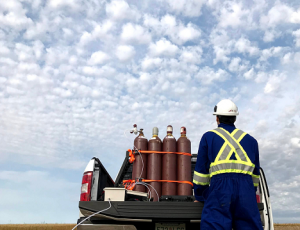Research shows getting tough on methane could reduce warming by 0.3 C
If Canada and other countries are serious about preventing global temperatures from rising more than 1.5 C, scientists say they should start with tougher regulations to slash methane pollution
The Narwhal, October 21, 2021
By Ali Raza
Professor Matthew Johnson says there’s a clear starting point for governments looking to stabilize the atmosphere to achieve net-zero greenhouse gas pollution.
While decision makers often talk about the carbon dioxide emissions produced during combustion of fossil fuels, Johnson, a researcher from Carleton University, notes there is a much more powerful greenhouse gas that must not be forgotten.
“If we’re serious about net-zero, at any date, by 2050, the absolute first thing that has to go to zero is methane,” Johnson tells The Narwhal in an interview.
Johnson recently co-authored a study that found oil and gas companies, along with governments, are underestimating the amount of methane that is leaking from oil and gas production. The initial research found methane emission levels in British Columbia were 1.6 to 2.2 times higher than current federal inventory estimates.
As his team continues to survey 8,000 sites across the country, there is mounting evidence from a range of scientific studies and assessments, including the latest report from the Intergovernmental Panel on Climate Change, that indicates existing government policies are failing to adequately tackle the methane emissions that could trigger some of the worst potential outcomes of the climate crisis.
At the same time, some of the research shows how governments and industry can get ahead of the problem and achieve significant reductions in global heating, faster than similar action that is aimed at slashing CO2 pollution.
“The first step to any reduction has to be to measure it,” Johnson says. “I think the regulations we have are an important first step, but I think people would be naive to think that we aren’t going to have to go a whole lot further.”


